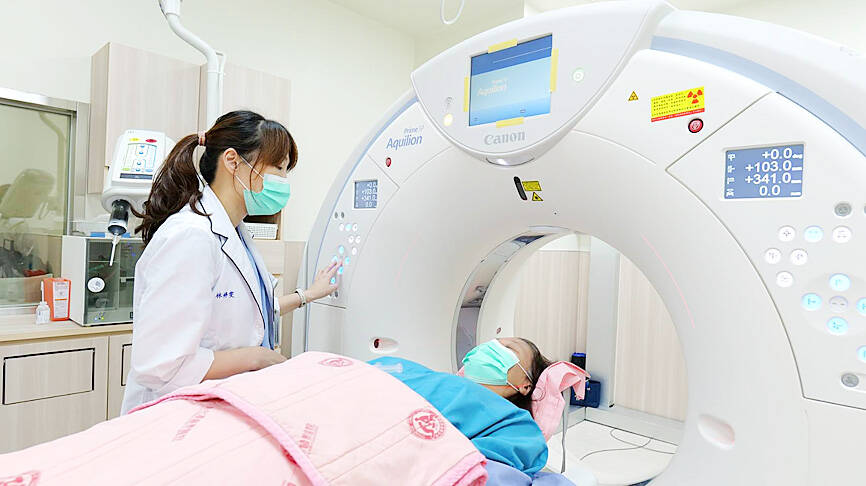The mortality rate of lung cancer in Taiwan has declined for nine consecutive years, with early detection through screening the key to significantly improving survival rates, the Health Promotion Administration (HPA) said yesterday.
Lung cancer is the leading cause of cancer-related deaths worldwide, WHO data showed.
Nearly 2.5 million people were diagnosed with lung cancer in 2022 and more than 1.8 million people died from the disease, International Agency for Research on Cancer data showed.

Photo courtesy of Changhua Christian Hospital
In Taiwan, the standardized mortality rate of lung cancer has declined for nine consecutive years, although the disease still killed 10,348 people last year and it is the leading cause of cancer-related deaths in the nation, the HPA said.
The case fatality rate is relatively high, but it varies significantly based on the stage at diagnosis, it said.
In 2022, 6.2 percent of people with the disease were diagnosed at stage 0, 32.3 percent at stage 1, 3.7 percent at stage 2, 10.4 percent at stage 3 and 47.7 percent at stage 4, HPA data showed.
The five-year survival rate at stage 1 is about 90 percent, but it drops to nearly 60 percent at stage 2, nearly 30 percent at stage 3 and only about 10 percent at stage 4, showing a significant difference between early and late detection, the agency said.
Detecting lung cancer early is key to increasing survival rates, it said.
The HPA said it has expanded eligibility for government-funded low-dose computed tomography (LDCT) lung cancer screenings this year based on the recommendation of the US Preventive Services Task Force’s recommendation that heavy smokers undergo the screenings, as well as the results of a domestic study titled “Taiwan Lung Cancer Screening In Never-smoker Trial.”
With the expanded criteria, people who meet one of two high-risk criteria are eligible for a LDCT every two years, the HPA said.
The two criteria are: men aged 45 to 74 and women aged 40 to 74 who have a family history of lung cancer — meaning that a biological parent, sibling or child has been diagnosed with lung cancer; and adults aged 50 to 74 who are heavy smokers or were heavy smokers, but have not smoked for 15 years or less.
The HPA defines a “heavy smoker” as someone with a smoking history of at least 20 “pack-years,” ie, when packs of cigarettes per day and years of smoking are multiplied, it gives 20. For example, more than one pack per day for 20 years or half a pack per day for 40 years.
HPA Director-General Wu Chao-chun (吳昭軍) said that LDCT can detect early lung cancer, but it cannot reduce incidence rates, so the best prevention is to quit smoking.
Studies suggest that smokers can reduce their risk of lung cancer by 50 percent if they have quit smoking for 10 to 15 years, Wu said.

The manufacture of the remaining 28 M1A2T Abrams tanks Taiwan purchased from the US has recently been completed, and they are expected to be delivered within the next one to two months, a source said yesterday. The Ministry of National Defense is arranging cargo ships to transport the tanks to Taiwan as soon as possible, said the source, who is familiar with the matter. The estimated arrival time ranges from late this month to early next month, the source said. The 28 Abrams tanks make up the third and final batch of a total of 108 tanks, valued at about NT$40.5 billion

Two Taiwanese prosecutors were questioned by Chinese security personnel at their hotel during a trip to China’s Henan Province this month, the Mainland Affairs Council (MAC) said yesterday. The officers had personal information on the prosecutors, including “when they were assigned to their posts, their work locations and job titles,” MAC Deputy Minister and spokesman Liang Wen-chieh (梁文傑) said. On top of asking about their agencies and positions, the officers also questioned the prosecutors about the Cross-Strait Joint Crime-Fighting and Judicial Mutual Assistance Agreement, a pact that serves as the framework for Taiwan-China cooperation on combating crime and providing judicial assistance, Liang

A group from the Taiwanese Designers in Australia association yesterday represented Taiwan at the Midsumma Pride March in Melbourne. The march, held in the St. Kilda suburb, is the city’s largest LGBTQIA+ parade and the flagship event of the annual Midsumma Festival. It attracted more than 45,000 spectators who supported the 400 groups and 10,000 marchers that participated this year, the association said. Taiwanese Designers said they organized a team to march for Taiwan this year, joining politicians, government agencies, professionals and community organizations in showing support for LGBTQIA+ people and diverse communities. As the first country in Asia to legalize same-sex

MOTIVES QUESTIONED The PLA considers Xi’s policies toward Taiwan to be driven by personal considerations rather than military assessment, the Epoch Times reports Chinese President Xi Jinping’s (習近平) latest purge of the Chinese People’s Liberation Army (PLA) leadership might have been prompted by the military’s opposition to plans of invading Taiwan, the Epoch Times said. The Chinese military opposes waging war against Taiwan by a large consensus, putting it at odds with Xi’s vision, the Falun Gong-affiliated daily said in a report on Thursday, citing anonymous sources with insight into the PLA’s inner workings. The opposition is not the opinion of a few generals, but a widely shared view among the PLA cadre, the Epoch Times cited them as saying. “Chinese forces know full well that